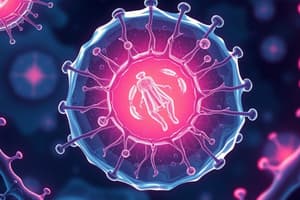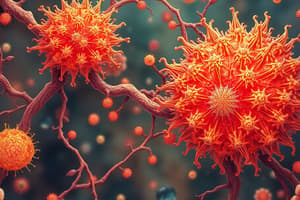Podcast
Questions and Answers
Which type of muscle tissue is responsible for movement in the heart?
Which type of muscle tissue is responsible for movement in the heart?
- Skeletal muscle
- Cardiac muscle (correct)
- Nervous tissue
- Smooth muscle
Smooth muscle is found in the heart.
Smooth muscle is found in the heart.
False (B)
What is the primary function of meristematic tissue in plants?
What is the primary function of meristematic tissue in plants?
Growing new parts of the plant
Xylem moves substances from the ______ to the leaves.
Xylem moves substances from the ______ to the leaves.
Match the following plant tissues with their primary functions:
Match the following plant tissues with their primary functions:
What process allows cells to develop in different ways to perform specific functions?
What process allows cells to develop in different ways to perform specific functions?
All cells in the body originated from somatic cells.
All cells in the body originated from somatic cells.
What type of stem cells are found in embryos?
What type of stem cells are found in embryos?
Epithelial tissue forms __________ that produce hormones, enzymes, and sweat.
Epithelial tissue forms __________ that produce hormones, enzymes, and sweat.
Match the type of tissue to its primary function:
Match the type of tissue to its primary function:
Which type of stem cells have a limited ability to create a variety of cell types?
Which type of stem cells have a limited ability to create a variety of cell types?
Meristematic cells in plants are only active during the initial growth phase.
Meristematic cells in plants are only active during the initial growth phase.
What connects muscles to bones in the body?
What connects muscles to bones in the body?
Flashcards
Cell Specialization
Cell Specialization
The process where cells develop unique structures and functions to perform specific tasks in an organism.
Differentiation
Differentiation
The process where cells change and acquire specialized functions, becoming different from their original state.
Stem Cells
Stem Cells
Unspecialized cells capable of developing into various cell types or remaining unspecialized and dividing.
Embryonic Stem Cells
Embryonic Stem Cells
Signup and view all the flashcards
Adult Stem Cells
Adult Stem Cells
Signup and view all the flashcards
Meristematic Cells
Meristematic Cells
Signup and view all the flashcards
Tissue
Tissue
Signup and view all the flashcards
Epithelial Tissue
Epithelial Tissue
Signup and view all the flashcards
Skeletal Muscle
Skeletal Muscle
Signup and view all the flashcards
Smooth Muscle
Smooth Muscle
Signup and view all the flashcards
Cardiac Muscle
Cardiac Muscle
Signup and view all the flashcards
Meristematic Tissue
Meristematic Tissue
Signup and view all the flashcards
Epidermal Tissue
Epidermal Tissue
Signup and view all the flashcards
Study Notes
Cell Specialization
- Cells specialize to perform specific functions
- Example: animal cells become lung, skin, or brain cells; plant cells become xylem or phloem.
Differentiation
- Differentiation is the process where cells change and develop different functions
- Embryonic stem cells can differentiate
Stem Cells
- All body cells originate from stem cells
- Stem cells are unspecialized cells
- Stem cells can differentiate into specialized cells or remain unspecialized and divide
- Three types of stem cells:
Embryonic Stem Cells
- Found in embryos
- Capable of differentiating into various cell types
Adult Stem Cells
- Formed from differentiated embryonic stem cells
- Can differentiate into a limited range of cell types
Meristematic Stem Cells
- Plant stem cells
- Found in root and stem tips (and cambium)
- Active throughout the plant's life, continuously producing new cells
Tissue
- Groups of cells working together for specialized tasks
- Two main types: animal and plant tissues
Animal Tissues
- Epithelial Tissue:
- Lines body cavities and outer surface
- Protects and forms glands
- Tightly packed cells form a barrier
- Connective Tissue:
- Supports, protects, and connects tissues
- Includes tendons, ligaments, bones, cartilage, and blood
- Muscle Tissue:
- Enables movement in joints, blood vessels, and organs
- Three types: skeletal, smooth, and cardiac
- Nervous Tissue:
- Responds to stimuli
- Transmits and stores information using nerve cells
Plant Tissues
- Meristematic Tissue:
- Plant stem cells, found in growth areas
- Continuously divides by mitosis
- Epidermal Tissue:
- Protective outer covering
- Controls material and gas exchange (e.g., stomates)
- Ground Tissue:
- Provides support and strength (stem)
- Stores food and water (roots)
- Involved in photosynthesis (leaves)
- Vascular Tissue:
- Moves substances throughout the plant
- Two types:
- Xylem: transports water and nutrients from roots to leaves
- Phloem: transports sugars from leaves to other parts of the plant
Studying That Suits You
Use AI to generate personalized quizzes and flashcards to suit your learning preferences.
Description
Test your knowledge on cell specialization and differentiation with this quiz. Explore the different types of stem cells and their functions within both animal and plant systems. Understand how cells develop specialized roles to contribute to the overall functioning of organisms.




